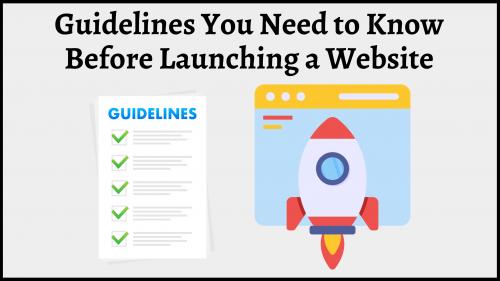Guidelines You Need to Know Before Launching a Website

Websites are important for everyone, whether for a business or an individual. They should be well-crafted and precise to the requirements. This will help a business or individual in various aspects, whether to enhance or expand a brand's presence. It is harsh but true that most users still get confused while forming a website. Various reasons can unfold this truth, but the predominant one is lagging where it requires the most, which is not having proper clarity to initiate the process.
Think of it as you are building a new house. Only you clearly understand the type of house you want to build, including the required window and door types, stairs, and other things. A website is no different. A well-thought-out plan is ideal to achieve this.
However, launching a website is more challenging than you think. It requires careful consideration of the basic yet essential parameters that can help you. You can either do it on your own or work with a web development company. If you opt for services, the experts will guide you in formulating a website plan that ideally relates to your brand's requirements.
Points to Consider Before Launching a New Website
Launching a website is an exciting milestone for any business or individual looking to establish an online presence. However, a successful website launch requires careful planning and execution. Before hitting the launch button, here are essential guidelines to ensure your website is ready for the world.
Define your Purpose and Goals
The first step is to define the purpose of your website. This means what type of web solution you are creating, whether an eCommerce site, service-based website, or a basic blogging website. This will provide you with a clear idea so that you can make a better and more informed decision on design and content., ensuring that each element of your website serves its purpose more efficiently. Moreover, set specific and measurable goals for your project. It can include traffic, engagement, lead generation, or sales targets. You should have clear and achievable goals. You can only track your website’s success and make the required adjustments.
Choose a Domain Name
After identifying your website's purpose and goals, the next step is to secure your name online. This means you must buy a domain name matching your business’s name. Various platforms can help you find one, and while doing research, try to focus on that you get an exact name or, if not, then find a combination that is similar to what you want. If you find one, reserve the name by booking it before anyone else could.
Pick a Suitable CMS
After buying a domain name, the next step is to choose a suitable content management system for your project. Consider your business requirements before making any move. This will ensure that you find the right CMS for your project.
Plan Content Strategy
Content is the backbone of any website and is helpful in achieving a better position on the search engine. Create a strategy for writing content that looks engaging, quality-oriented, and relevant to your business niche before launching a new website. This includes text, images, videos, and any other media that will be featured on your site. Moreover, writing anything does not help you with search engine rankings. You should optimize your content for search engines to improve your website's visibility. Use relevant keywords, create meta tags, and ensure your content is structured correctly with headings, subheadings, and bullet points.
Develop User Experience
After creating a content strategy, it's time to design your site's user experience. Focus on a simple and intuitive navigation bar, utilizing appropriate color, font, and other aspects that can blend and help you create a user-friendly UI. Furthermore, responsive mobile design is important before launching a new website.
Test it
The website you created should work well without any flaws; to ensure this, you need to perform quality testing. An expert team can help you with this. They will do everything necessary, from functionality to manual testing, to ensure your site works without any bugs or glitches.









Comments